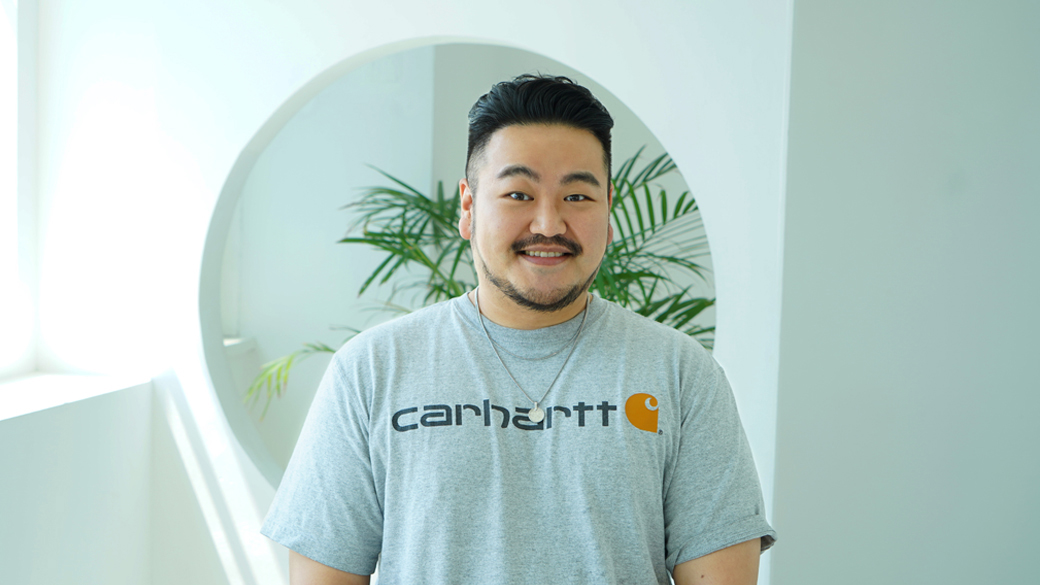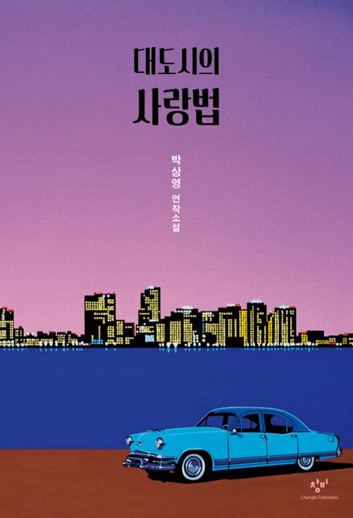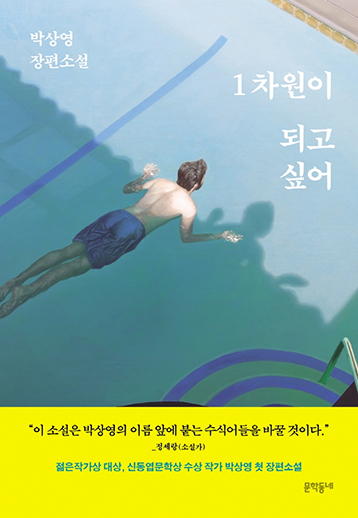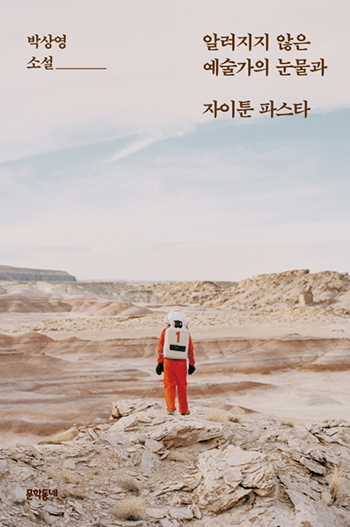|
Korean Authors
Writer Park Sang-Young A Joyful Solidarity Built Between the Writer and their Readers Through Novels
2022.07.04
Pursuing joy in life is one of the privileges given to human beings. Of the many strengths of fiction, readers particularly love finding joy inside the stories. People enjoy reading fiction that is fun and easily readable. One of the writers talented in maximizing such characteristics of fiction is Park Sang-Young, who creates the common ground of “writing joy” and “reading joy” between him and his readers through his stories. Park has been creating a synergy effect, encouraging readers to share the joy and feel solidarity with him. Let’s dive into the delightful moment with writer Park Sang-Young, who exerted his unique joyful energy throughout the interview.

Please say hello to our subscribers.
Hello, I’m novelist Park Sang-Young. I’ve written fiction such as Love In the Big City (Changbi Publishers), and I Want to be One-Dimensional (Munhakdongne).

After winning the Sin Dong-Yup Prize for Literature with your Love In the Big City, you were also nominated for the Booker Prize, not to mention winning literary prizes each year since your debut. This is never an ordinary career for an author who has won both public popularity and literary recognition. So how do you feel about your accomplishments, and where do you think such a literary capacity came from?
I think winning a prize is sheer luck. When I just made my debut, there were many attempts to find new literature. As the genres of my works were rare in the existing literary field, I could receive much attention in my early days. Well, winning a prize always makes me happy. I feel really good, and when I was nominated for the Booker Prize, I couldn’t actually believe the news as I had never thought that it was something that could happen in my life. I don’t actually feel the love from the public, readers, and critics to my skin, but I’m truly grateful for the good reviews.
Love In the Big City and I Want to be One-Dimensional

As a young writer, you have been covering many stories about youth, while making an unrivaled career in queer literature in particular. So, you have been writing across various genres. Where do you usually get your inspiration? Also, what kind of stories do you aim to discuss in your works?
I get inspiration from every part of my life. I get it from things like articles I skim through or conversations with my friends. I try to make my stories as abundant as possible. So, I like wandering around a lot, have a great interest in how others are living, and look deep into my heart – these are where I get the motives for my stories.

Evaluating yourself, what do you think is the greatest charm of your work? Please also tell us about the energy and feeling of accomplishment you get from writing stories.
The books I like to read are those with great readability. So, I put a lot of effort into writing and editing my works so they can be read seamlessly. I think that the reason why many readers like my works is because they are easy and quick-to-read with strong storylines and jokes put in between boring parts. I guess these are the charming points of my stories.

You have also written Work in Seoul, Sleep in Jeju, a non-fiction work about your experience in “Gapado Artist in Residence” run by the Jeju Foundation for Arts and Culture. How did this experience affect your work?
It was a whole new experience as it was the first time I lived in a so-called rural or remote area. I thought that I was more of an urban man that couldn’t live in isolated places where there were no people at all, but as I lived for some time in Gapado, I could realize that another part of myself enjoyed the leisurely time. I had suffered quite a lot from burn-out syndrome after writing I Want to be One-Dimensional, but I could get better as I stayed in Gapado. Thanks to my stay, the writing spirit burst in my heart. The novel, set to be published in July, strongly reflects the experiences and inner states I had during my stay.
I feel pleased when I share things with so many people that

You have been actively releasing works and serializing stories while busy with schedules in other fields than writing. Is there a special competitiveness that helps you write stories without losing energy?
I think writing stories is a job I have to do for a living. As a full-time writer, I’m open to any work-related requests as I have to keep a certain amount of income. But as I realized that I needed a brake to control the speed and flow of work, I signed a contract with an agency and found the right amount of manuscript I could write steadily without getting exhausted. So, these days I’m trying to work for just that set amount. And I signed a contract with the agency because I wanted to create an environment where I could keep writing stories without getting burned out. And as I became free from issues surrounding guarantees or schedules, I got more space to focus on things I wanted to do.

You have been appearing on TV quite a lot. It is assumed that working through various media broadens the scope of communication and experience, ultimately serving as the driving force for writing better stories. What do you think?
My upcoming novel includes many stories about it, by the way. Showing up on various media personally helped me in gathering data. It’s not just the staff I meet on the shows; as I get to meet people from so many different circles on TV shows about liberal art (ex. Yemen immigrant in Jeju, crime profilers, etc.), second-hand experiences through conversations with them often became the fertilizer for my works. Also, it was a kind of spill-over effect that my heightened reputation through TV shows helped boost sales – I truly enjoy appearing on various media.

Apart from your nomination for the Booker Prize, your The Tears of an Unknown Artist, or Zaytun Pasta, was translated and serialized on WWB (Words Without Borders), a literary magazine in the US. It has been receiving good feedback from international fans – is there anything you are preparing in particular for overseas publication?
I’m coordinating my schedule as I got many invitations for international book festivals this year and next. Well, as a matter of preparation, I’m taking English classes as a hobby. But, I’m still the same person, the same writer, and as I’m writing stories that are read by people using my mother tongue, I’m not particularly putting effort into overseas publications.
The Tears of an Unknown Artist, or Zaytun Pasta

Many of your works have been published internationally. Is there a particular book that you want to recommend overseas readers to read?
In the book The Tears of an Unknown Artist, or Zaytun Pasta, there is a short queer story titled Fake Viagra and Drugs Made in China, a Short Joke About Urine that Doesn’t Collect Anywhere. This is one of the stories I like the most. It contains many elements that foreigners might find interesting, so I suggest reading this. Also, Missing: Paris Hilton and The Busan International Film Festival are stories in the same collection that continue as a series. I hope many people read this as they are stories about engaged people.

Your next moves are highly anticipated as you are a young writer. So what are your future plans?
At some point, I stopped having long and grandiose dreams. I don’t think life goes in the direction I want. So, I changed the paradigm and told myself to do one thing I could do every day, which made my life simple and fun. If I had set a goal of becoming an author and winning the Booker Prize, I might not have become a writer like myself today and would have been so frustrated when I failed to make it to the final nomination. As I always think to myself, “Write exciting stories” instead of having macroscopic goals, it was like a gift when I got nominated for the prize. Everything is always so fun. It is my goal to continue writing fun stories, and enjoying communicating with my readers.
#Park Sang-Young#Sin Dong-Yup Prize for Literature#Booker Prize#Queer literature |
Pre Megazine
-

Yellowpig
VOL.70
2024.05 -

Writer Jung Yeong-Wook
VOL.70
2024.05 -

Jakkajungsin Publishing Co.
VOL.69
2024.04 -

Writer Yun Jung-Eun
VOL.69
2024.04 -

Jumping Books Publishing House
VOL.68
2024.03 -

Writer Kim Hwa-Jin
VOL.68
2024.03 -

Publisher Hyohyung
VOL.67
2024.02 -

Writer Minha
VOL.67
2024.02 -

Almond Publishing
VOL.66
2024.01 -

Writer Kwon Jung-Min
VOL.66
2024.01 -

Hakgojae Publishers
VOL.65
2023.12 -

Writer Kim Hye-Jung
VOL.65
2023.12 -

Eidos Publishing House
VOL.64
2023.11 -

Writer Hwang In-Chan
VOL.64
2023.11 -

Munhakdongne
VOL.63
2023.10 -

Writer Chang Kang-myoung
VOL.63
2023.10 -

Happywell Publishing
VOL.62
2023.09 -

Writer Baik Soulinne
VOL.62
2023.09 -

Dasan Contents Group (Dasan Books)
VOL.61
2023.08 -

Writer Lim Kyoung-Sun
VOL.61
2023.08 -

SpringSunshine Publishing Co.
VOL.60
2023.07 -

Writer Lee Kyung-Hye
VOL.60
2023.07 -

Human Cube
VOL.59
2023.06 -

Doctor Jeong Jae-Seung
VOL.59
2023.06 -

Anonbooks
VOL.58
2023.05 -

Writer Son Bo-Mi
VOL.58
2023.05 -

Namhaebomnal
VOL.57
2023.04 -

Writer Kim Bo-Young
VOL.57
2023.04 -

Hugo Publishing
VOL.56
2023.03 -

Writer Cho Kwang-Hee
VOL.56
2023.03 -

Balgeunmirae Publishing Co.
VOL.55
2023.02 -

Writer Lee Byung-Ryul
VOL.55
2023.02 -

Wisdom House, Inc
VOL.54
2023.01 -

Writer Jeong Jia
VOL.54
2023.01 -

Humanitas
VOL.53
2022.12 -

Writer Kim Yeon-Su
VOL.53
2022.12 -

Songsongbooks
VOL.52
2022.11 -

Writer Eun Hee-Kyung
VOL.52
2022.11 -

Bombom Publishing Co.
VOL.51
2022.10 -

Writer Jiwon Yu
VOL.51
2022.10 -

Hangilsa Publishing Co., Ltd.
VOL.50
2022.09 -

Writer Kim Won-Young
VOL.50
2022.09 -

Moksu Publishing Company
VOL.49
2022.08 -

Writer Yoo Sun-Kyong
VOL.49
2022.08 -

Next Wave
VOL.48
2022.07 -

Writer Park Sang-Young
VOL.48
2022.07 -

A Thousand Hopes
VOL.47
2022.06 -

Writer Bora Chung
VOL.47
2022.06 -

Woongjin ThinkBig
VOL.46
2022.05 -

Dr. Oh Eun-Young
VOL.46
2022.05 -

JECHEOLSO Publishing House
VOL.45
2022.04 -

Writer Jang Ryu-Jin
VOL.45
2022.04 -

Changbi Publishers
VOL.44
2022.03 -

Writer Kim Ho-Yeon
VOL.44
2022.03 -

Mati Books
VOL.43
2022.02 -

Writer Lee Kkoch-Nim
VOL.43
2022.02 -

Picturebook Gongjackso
VOL.42
2022.01 -

Writer Kim Sang-Wook
VOL.42
2022.01 -

Writer So-yeon Park
VOL.42
2022.01 -

Writer Yoo Eun sil
VOL.42
2022.01 -

Kungree Press
VOL.41
2021.12 -

Writer Kim Lily
VOL.41
2021.12 -

Writer Park Yeon-jun
VOL.41
2021.12 -

Writer Yi Hyeon
VOL.41
2021.12 -

A deeper world told through picture books 'Iyagikot Publishing (Story Flower)'
VOL.12
2019.06 -

Author Jeon Min-hee
VOL.12
2019.06 -

Illustrator Kim Hwan-Young
VOL.13
2019.07 -

Travelers sailing through the sea of knowledge - 'Across Publishing Group Inc.'
VOL.13
2019.07 -

Genre Novel Publisher 'Arzak Livres'
VOL.14
2019.08 -

Author Lee Yong-han
VOL.14
2019.08 -

Wookwan Sunim
VOL.15
2019.09 -

East-Asia Publishing
VOL.15
2019.09 -

Author Jo Jung-rae
VOL.16
2019.10 -

EunHaeng NaMu Publishing
VOL.16
2019.10 -

Writer Heo Kyo bum
VOL.40
2021.11 -

Writer Kim So-Young
VOL.40
2021.11 -

Author-illustrator Kim Sang Keun
VOL.40
2021.11 -

ACHIMDAL BOOKS
VOL.40
2021.11 -

Author Kang Gyeong-su
VOL.17
2019.11 -

Moonji Publishing Belongs to the Literary Community
VOL.17
2019.11 -

Author Kim Yun-jeong
VOL.18
2019.12 -

I-Seum
VOL.18
2019.12 -

Kim Cho-Yeop
VOL.19
2020.02 -

Creating a window into the future with books
VOL.19
2020.02 -

Author Serang Chung
VOL.20
2020.03 -

Hey Uhm
VOL.20
2020.03 -

Writer Lim Hong-Tek
VOL.21
2020.04 -

BIR
VOL.21
2020.04 -

Writer Song Mikyoung
VOL.39
2021.10 -

Author-illustrator Kim Dong Su
VOL.39
2021.10 -

Writer Lee Seula
VOL.39
2021.10 -

Tabi Books
VOL.39
2021.10 -

Writer Kim Soo-hyun
VOL.38
2021.09 -

Author-illustrator Lee Myoung Ae
VOL.38
2021.09 -

Writer Hwang Sunmi
VOL.38
2021.09 -

Kidari Publishing Co.
VOL.38
2021.09 -

Writer Sohn Won-Pyung
VOL.22
2020.05 -

Woods of Mind's Books
VOL.22
2020.05 -

Writer Heungeul
VOL.23
2020.06 -

Gloyeon
VOL.23
2020.06 -

Maumsanchaek
VOL.24
2020.07 -

Winners of the 2021 Bologna Ragazzi Award
VOL.37
2021.08 -

Picture book artist Lee Suzy
VOL.37
2021.08 -

Author-illustrator Yi Gee Eun
VOL.37
2021.08 -

Hubble
VOL.37
2021.08 -

Writer Baek Se-Hee
VOL.25
2020.08 -

Bearbooks Inc.
VOL.25
2020.08 -

Author Baek Hee-Na
VOL.26
2020.09 -

Yuksabipyoungsa
VOL.26
2020.09 -

Writer Kang Hwa-Gil
VOL.27
2020.10 -

Kinderland (Bandal)
VOL.27
2020.10 -

Writer Ha wann
VOL.36
2021.07 -

Author-illustrator Myung Soojung
VOL.36
2021.07 -

Writer Jung Yeo-Wool
VOL.36
2021.07 -

Publisher EcoLivres
VOL.36
2021.07 -

Writer Lee Geumi
VOL.28
2020.11 -

Sakyejul
VOL.28
2020.11 -

Writer Kim Keum-Hee
VOL.29
2020.12 -

Geulhangari
VOL.29
2020.12 -

Writer Cheon Seon-Ran
VOL.30
2021.01 -

Hyang Publishing House
VOL.30
2021.01 -

Writer Lee Hee-Young
VOL.31
2021.02 -

Sanzini
VOL.31
2021.02 -

Publisher Prunsoop
VOL.32
2021.03 -

Writer Sim Yun-Kyung
VOL.32
2021.03 -

Hanbit Media
VOL.35
2021.06 -

Hyeonamsa
VOL.33
2021.04 -

Author-illustrator Noh Inkyung
VOL.33
2021.04 -

Writer Cho Won-Jae
VOL.35
2021.06 -

Writer Kim Jung-Mi
VOL.34
2021.05 -

Safehouse Inc.
VOL.34
2021.05













